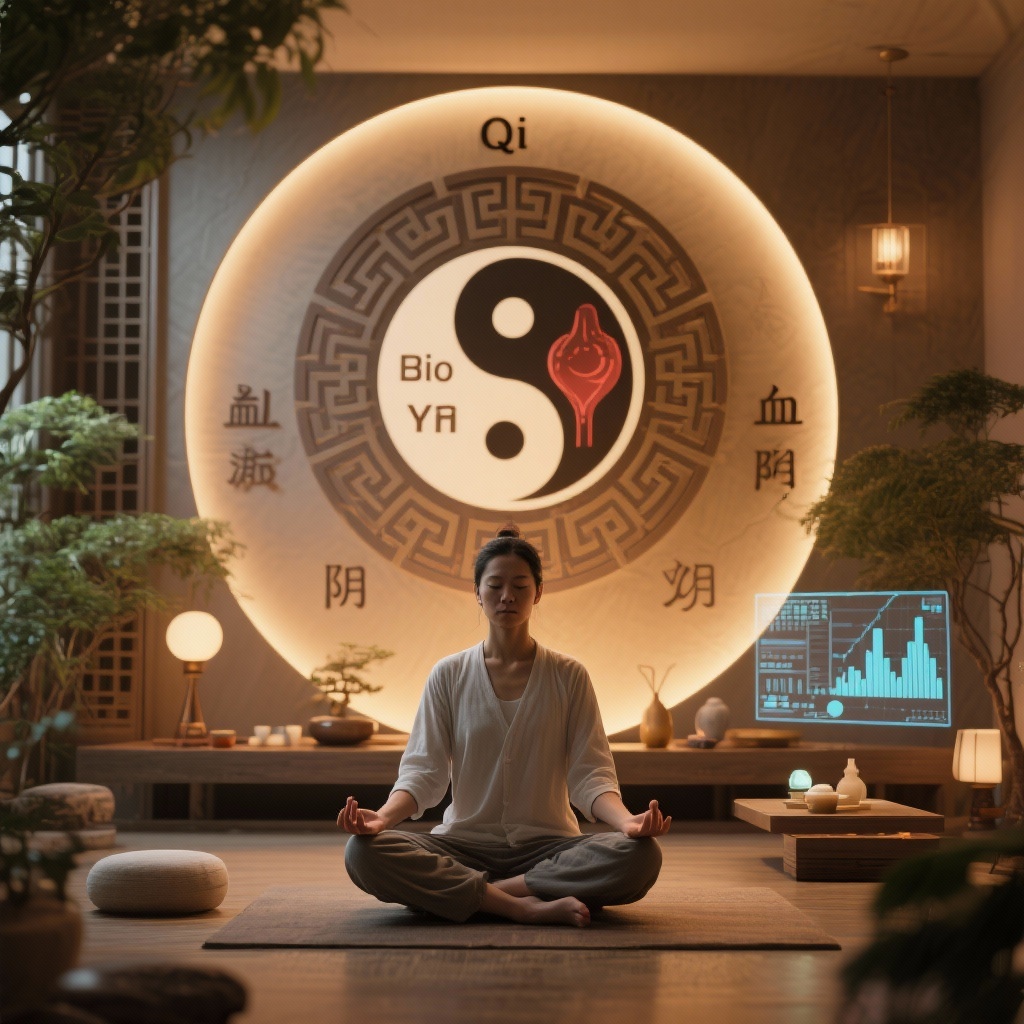Astoundingly Simple: Mastering Your Qi Blood Yin Yang Balance
In Traditional Chinese Medicine (TCM), Qi and Blood are your body’s fundamental substances. These vital elements actively fuel every essential process. Yin and Yang describe universal attributes and natural shifts in everything. These core concepts are deeply interconnected, offering profound insights into your health. Think of them as the complex operating system for your entire being. Understanding your Qi Blood Yin Yang Balance is key to recognizing true wellness. It helps you effectively unlock your body’s most intricate secrets.

Grasp the Core: Decoding Basic Concepts
TCM views Qi and Blood as essential for life, much like fuel and oil. They are the tangible and intangible aspects of your being. Yin and Yang represent the dualistic forces influencing all existence. This ancient framework explains how your body functions day-to-day. A holistic understanding emerges from these foundational ideas.
Discover the Dynamics: How Qi & Blood Take On Yin & Yang
Qi is categorized as Yang because of its active, moving nature. It provides warmth, drives bodily functions, and offers protection. This energetic force tends to be light and ascends, embodying the very essence of Yang. Blood, conversely, is considered Yin for its nourishing, grounding qualities. It moistens tissues, carries nutrients, and anchors the spirit. Blood has a heavier nature, often moving downwards, aligning with Yin characteristics.
Visualize the Connection: Unpacking Their Roles
Imagine Qi as the sun, constantly giving energy and warmth to everything it touches. Blood then acts like the moon, providing a calming, moisturizing influence. This dynamic duo ensures your body runs smoothly and efficiently. Understanding this relationship is critical for overall well-being.
Recognize the Interplay: Why One Can’t Thrive Without the Other
Qi acts as the commander of Blood, pushing it through your veins and tissues. Without sufficient Qi, blood flow would become stagnant, like a traffic jam in your body. Blood, in turn, serves as the nurturing foundation for Qi production and function. If your blood is weak or insufficient, your Qi will also suffer greatly. This intricate interdependence mirrors the Yin and Yang principle. Each contains elements of the other, confirming they are absolutely indispensable. Maintaining a healthy Qi Blood Yin Yang Balance is crucial for overall vitality. Learn more about their combined power at Qi & Blood. Finding your internal harmony is vital.
Spot the Symptoms: Unveiling Imbalances in Your Body
When your Qi and Blood fall out of sync, an imbalance in Yin and Yang typically follows. A deficiency of Qi (often linked to Yang deficiency) can lead to blood stagnation. This happens because the vital pushing force is simply not strong enough. Similarly, Blood deficiency (a form of Yin deficiency) might cause Qi to float upwards. There isn’t enough grounding Yin to hold the Yang energy down effectively. Many people experience both Qi and Blood deficiency simultaneously. This state is often a clear indication of a deeper Yin and Yang depletion.
Identify Root Causes: Understanding Pathology
Addressing these underlying imbalances is crucial for restoring health. Persistent fatigue or cold hands might signal a deeper issue. Your body sends subtle clues when its energetic balance is off. Focusing on your Qi Blood Yin Yang Balance helps pinpoint solutions. Restoring your energetic equilibrium is paramount.
Connect the Dots: Real-World Health Scenarios
Consider someone with anemia; they not only have low red blood cell counts (Blood deficiency). They often also report feeling fatigued and short of breath, indicating Qi deficiency. This scenario perfectly illustrates a combined Yin and Yang depletion within the body. Another example is hypertension, where Liver Yang might rise excessively (like a surge of rebellious Qi). Patients also frequently present with signs of blood stasis. These cases highlight the complex connections between Qi, Blood, Yin, and Yang dynamics. This constitutional balance impacts everything. Exploring solutions can be found at Nourishing Blood.
Heal Your Body: Fundamental Principles of Treatment
Effective treatment strategies must always consider both Qi and Blood, alongside Yin and Yang. Supplementing Qi should ideally be paired with nourishing Blood to ensure holistic recovery. Similarly, strengthening Yin often requires some support for Yang to maintain balance. A classic example is Dang Gui Bu Xue Tang. This formula combines Dang Gui to nourish Blood and Huang Qi to boost Qi. It beautifully embodies the principle of treating both aspects. This integrated view enhances your holistic health.
Integrate Practices: Balancing Your Daily Life
Engaging in regular physical activity helps promote the smooth flow of Qi throughout your system. Conversely, periods of calm and stillness nourish and replenish your Blood. Day-time activities are generally considered Yang, while nighttime rest and sleep are Yin. Structuring your lifestyle with a healthy mix of action and tranquility supports your natural Qi Blood Yin Yang Balance. Your dietary choices also play a crucial role in this harmony. Warm foods help invigorate Qi and support Yang energy. Simultaneously, moisturizing foods work to nourish Blood and strengthen Yin.

Ultimately Empowering: Cultivating Your Lasting Wellness
Understanding the intricate relationship between Qi, Blood, Yin, and Yang empowers you. It allows you to comprehensively recognize your current health status and adopt proactive strategies. This knowledge helps you design personalized wellness plans that truly fit your unique needs. Ultimately, it guides you towards a more harmonious and vibrant life. Optimizing your Qi Blood Yin Yang Balance is key to long-term health. For more detailed information on foundational concepts, visit Yin & Yang. Finding your energetic blueprint brings immense benefits. This holistic health perspective is truly invaluable. The alignment of these dualistic forces promotes overall vitality.
The concept of Yin and Yang has been foundational to understanding health for millennia. (PMID: PMID: 30218844)
Research continues to explore the physiological basis of Qi and Blood theories in modern contexts. (PMID: PMID: 29037748)
Traditional Chinese Medicine emphasizes tailored approaches based on individual patterns of imbalance. (PMID: PMID: 34185121)
Quick Check: Your 3-Second Self-Test!
If you often feel tired, cold, and mentally foggy → Immediately try gentle walking or stretching for 5 minutes to move your Qi.
If you often feel restless, anxious, and sleep poorly → Immediately drink a warm cup of herbal tea and rest your eyes for 5 minutes.
Medical Disclaimer:This article is for educational use only and is not a substitute for professional medical advice.